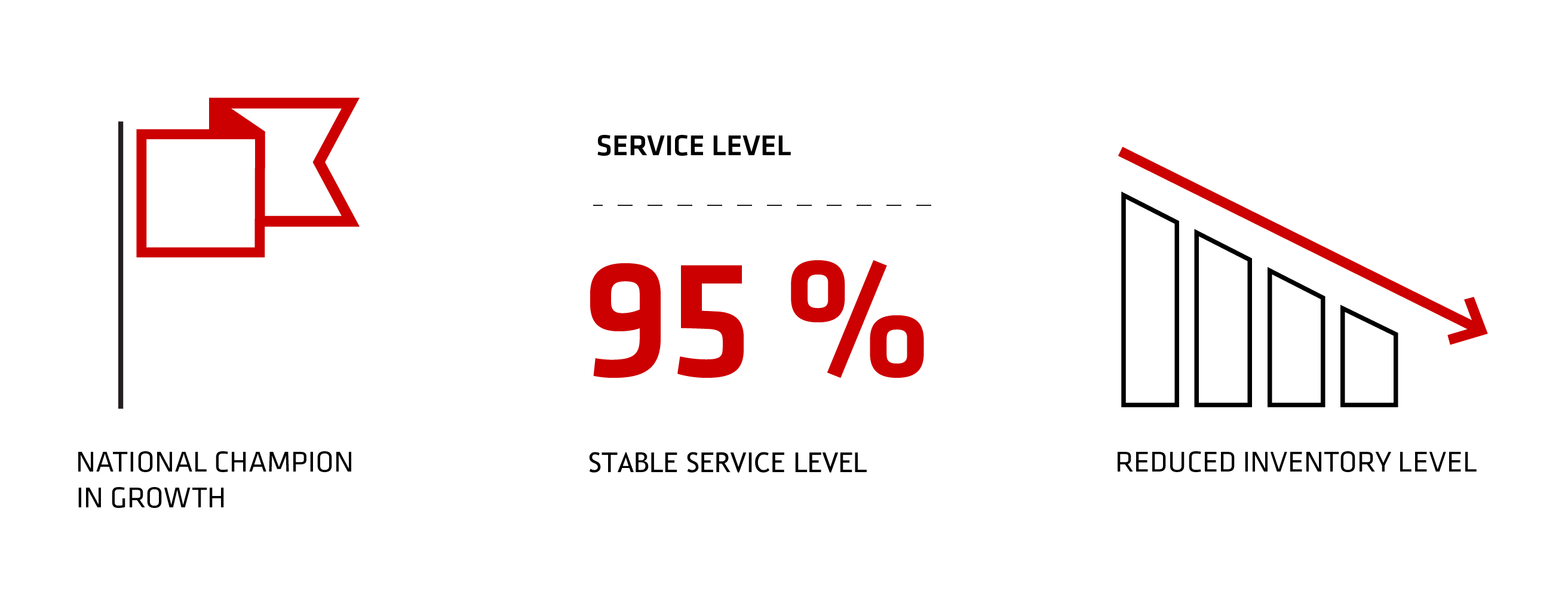Micro Matic has one of the steepest growth curves in Danish business and is sitting on 80% of the world market. Managing its service level, profitability and inventory value to balance its big accounts is therefore quite a task. But Micro Matic is succeeding.
“We’re growing rapidly, and our job in logistics and supply chain is to ensure continued growth that is profitable. For that, we use ABC. We need to reduce inventory value, increase supply capacity and address growing complexity,” says Nikolaj Kold, Head of Logistics and a contributor to Micro Matic’s growth journey since 2004.

In 2016, Micro Matic was named EY Entrepreneur of the Year. The award is given on the basis of economic growth and a number of other parameters such as the contractor’s role, values, leadership and social responsibility.
Great results in record time
Nikolaj explains: “We chose to use ABC in our raw materials warehouse as one of the key instruments for managing our growth, service level, profitability and complexity. We’ve now been working with ABC on our 8,000 raw materials for 10 months, and it’s already yielded great results. We’ve increased the service level from below 90% to a stable 95% and significantly reduced the inventory value despite the strong growth. As an additional benefit, we now use ABC actively in our dialogue with suppliers, and this is a great help as it’s so visual and easy to understand.”
Acceptance in the organisation is crucial
Nikolaj Kold does not hide the fact that the path to achieving broad acceptance of ABC in the organisation has been challenging. “Getting colleagues from logistics, production and purchasing to embrace and use the new ABC tool hasn’t been easy. It was seen as an extra task in a busy working day. One of the challenges was that I only have managerial responsibility in the logistics function and therefore had to influence colleagues in other functions “from the side.” But I soon convinced one employee, who took on the role of “ambassador”, and that was a great help. I chose to take on the operational responsibility for ABC myself and gradually managed to build momentum for the ABC project. Today, the employees are driving it themselves because its value has become visible.”
Embedding with the supply chain director
Nikolaj Kold emphasises the importance of good embedding of the project in the organisation.
“Like so many other tool-based changes, ABC is 80% about people and 20% about technology. It’s no use introducing a powerful IT tool if the employees don’t understand why they should do things differently and how it makes their work easier,” he says.
The ABC project is embedded with Micro Matic’s supply chain director, who is responsible for procurement, logistics and production. This embedding has ensured the necessary support in the start-up phase and given Nikolaj a mandate to create change.
Minimum inventory and excess inventory
Two key focus areas in the ABC project were to identify and manage minimum inventory and excess inventory. The correct minimum inventory for the various product categories is essential to the level of service to customers. Excess inventory is the warehouse’s “excess fat” that pushes inventory value to an unnecessarily high level. Other focus areas included:
- Phasing-out of dead items
- Procurement control by differentiated product management rules
- KPIs by ABC category
- Inventory value
- Turnover rate
- Availability (delivery performance)
- Clean-up of master data
“Over a six-month period, we ran four workshops in which where we worked with ABC and rules for procurement and inventory management. After the four workshops, we had a clear picture of our biggest challenges and a plan for how to address them,”
says Nicholas Kold.
Among other things, the workshops resulted in two conclusions:
- Minimum inventories were high, and the theoretical excess inventory was DKK 12.9 million.
- There was a need to tighten up the accuracy of delivery times, as this is extremely important to determining the minimum inventory level.
Fact-based insight
The ABC Project and the new rules for procurement and inventory management have created a fact-based transparency in Micro Matic’s logistics and product flow.
“We’ve gone from management based on feelings to management based on facts. The 80-20 rule applies here too, as 20% of the products create 80% of the value. This means we should devote most of our resources to the 20% of products that have the greatest importance for our business. ABC has given us the insight that enables us to practice this in everyday life,” says Nikolaj Kold.
He mentions checklists for product managers and product management rules for all ABC segments as examples of actions that help the organisation to prioritise resources on a daily basis.
“We no longer spend time creating data in Excel cubes. Instead, we spend our time analysing and working with the data, and product managers, purchasers and production planners have specific product management rules they can use as a starting point. This is a big step towards tighter common management across our value chain,” he says.
About Micro Matic
Micro Matic was founded in 1953, is privately owned and in recent years has focused on its core business. They are a contract manufacturer of equipment for dispensing draft beer, and they have a broad product range: From “draft beer systems in the cellar” to beer glasses. The company has factories in Denmark, the USA, the UK, Lithuania, China and Northern Ireland, turned over EUR 230 million in 2015-16 and employs around 1,500 people.
Micro Matic is one of four “Best Practice customers 2017”
Every year, ABC Softwork selects 4 strong Danish companies to share their experiences and best practices at a closed event for ABC customers: ABC Breakfast Club. Read the articles about this year’s three other best practice customers:
- JP Group strengthens its core business with ABC
- Dana Lim CEO uses ABC to manage the business
- Nomeco We’ve cracked the code for growth
